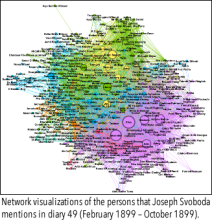The Svoboda Diaries Project (SDP), a primarily undergraduate lab under the auspices of NELC, engages in historical preservation of diaries from 19th century Iraq. In addition to transcribing handwritten manuscripts, the project finds ways to make the diaries more accessible to the public and develops new ways to engage with the content in the diaries.
In this post, we share two papers presented at conferences last fall. One of these, “Perceived Usability and Experience with Digital Tools in the Context of Digital Humanities Research,” explores how research interviews can inform the design of richer, interactive experiences with the historical resources. Three recent graduates, Jesse Du, Chris Yuen, and Micah Slaughter shared their experience interviewing historians and digital humanities scholars to learn more about their use of the online diary viewer, a feature on the SDP website that displays images of the handwritten diaries side-by-side with easy-to-read transcriptions. Aside from learning about how people’s backgrounds, work practices, and ways of thinking affect the ways they experience a website, the SDP interns also learned more about historical research and digital humanities projects from all over the world.
In another project, “Reflexivity in Issues of Scale and Representation in a Digital Humanities Project,” Dr. Annie Chen (UW) and Dr. Camille Cole (University of Cambridge) reflect on challenges in using natural language processing (automated textual analysis) and social network analysis, a research method that enables us to think about connections between people. How we represent people in an analysis – relying on collective terms that have to do with gender, nationality, ethnicity, and more – has a profound effect on how we interpret the world, and being aware of how our research practices consciously or unconsciously affect this interpretation is important. This paper also offers an inside account of some of the challenges and value in interdisciplinary and globally distributed collaborations; take a peek to learn more!
There are many ways to interact with a manuscript, and the Svoboda Diaries Project is working on imagining these types of experiences. For more information, to join or collaborate, please contact the Project Co-Directors, Drs. Selim Kuru and Annie Chen.
